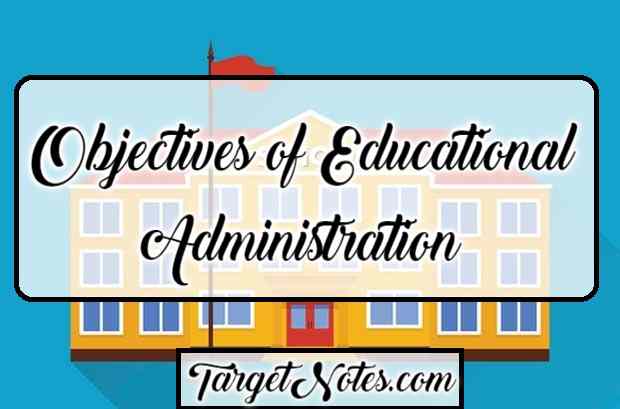
Contents
Objectives of Educational Administration
Man always develops new ideas, tries them out and perhaps rejects them or modifies them in the light of the experiences that have been gained. Hence in this sense, no aims and objectives can be final. They are influenced by age, time and conditions. Objectives of educational administration in the new set-up are different from old set-up. The aims and objectives also vary from place to place, from time to time and from society to society. But they always serve the purpose of upliftment, growth and development of the existing system of education. In the words of P.C. Wren “School administration which does not facilitate education is a parasite and a debauchery of public funds. School administration, therefore, exists only for the people and its efficiency must be measured by the extent to which it contributes to teaching and learning.” The following are some of the aims and objectives of school administration.
(i) Educational Administration aims at the Good of Education
Educational administration, however important or necessary should aim at the good of education, not vice-versa. Therefore, Kandel opines, “fundamentally the purpose of educational administration brings pupils and teachers under such conditions as will more successfully promote the end of education.” Similarly Sir Graham Balfour has stated very aptly, “the purpose of educational administration is to enable the right education from the right teachers, at a cost within the means of the state, which will enable students to profit by their learning
(ii) Educational Administration should aim at Providing High Chairs to the Best Fitted Persons
In some quarters people think it fit to appoint I.A.S. officers as Directors of School and College Education. But it is a fact of experience that civil servants moving from one department to another department, cannot have that emotional commitment to education or that deep understanding of the problems and needs and classroom situations, which would come naturally to a teacher or an educationist. Hence in school administration, whether be it a Director, Inspector of Schools, or Headmaster, must essentially be a teacher.
We further experience that biological seniority brings to high positions the old-timers and not those best fitted brilliant younger staff, capable of doing great things for the reconstruction of education. Some old-timers are exhausted men and women, whose main business would be with their pension case and post-retirement benefits. Therefore, educational administration, in the emerging Indian society should aim at providing high positions on the basis of merit and fitness
(iii) School Administration should aim at Providing Proper Facilities, Freedom and Encouragement to the Meritorious Teachers
An administrator, in other departments is considered successful, if he is a strong man, whose work is to secure conformity to rules and regulations. But the aim of an educational administrator is different. He has to be tolerant and sympathetic of non-conformism. He should not treat the teachers like clerks or another limb of administration. He should accord special consideration and status to them. The teacher as a builder and creator has to be allowed a lot of freedom of action. In general administration, the word of boss is law. The employees have to show unquestionable loyalty to their bosses. Not so in education. An educational administrator must behave as the first among equals. His duty should be to promote initiative, positive activities and great virtues and research which bring great credit to him. He should learn to accept the brilliant idea of some, genius, who may be only a junior teacher. As a result of this, teachers can be provided with proper facilities, freedom and encouragement to work towards the progress of better education.
(iv) Integration, not Division should be the Aim of School Administration
The new demand in the field of school administration is integration, not division. The administrative officers, the whole staff, all students and the other employees in the field of education should learn to work for common good. There should not be any division among them. The policy of “Divide and Rule” should be altogether abolished. The educational authority should enlist the cooperation of the teacher community. Democratic administration, believes, above all things, in the capacity of each individual to share and participate effectively in all policies and activities that concern him. The administrative authorities should realize that every teacher wants to express his opinion on the policy and problems of the school he serves. He is frustrated, when he is unable to do so. As such, it is necessary to provide opportunities to every teacher to bring his individual intelligence to bear most fully and appreciably on the solution of common problems.
(v) The Administrative Authorities must understand Mass Psychology
In the present society, there is an unprecedented demand that the authorities of school administration must understand mass psychology of students and teachers and provide the required leadership. A Director of Education or an Inspector of Schools or a Headmaster must frequently meet the young students and keep himself informed of their changing moods, shifting emotions and passing fancies. No officer can rule the young on the strength of power alone. He has to set right everything by correcting emotional imbalances by understanding their psychology. Then only unrest in the school campus can be controlled.
(vi) School Administration should aim at Encouraging Direct Democracy in Schools
In school administration, direct democracy, as in the city states of Greece, where all citizens sat in a hall and decided important matters, should be encouraged. The Headmaster of a school should deal with each aggrieved student or aggrieved party directly, not through any agency. Important matters should be decided in the presence of the staff and students, not by the headmaster alone.
(vii) School Administration should aim at Giving Justice
An educational administrator should aim at giving justice to the teachers in respect of recruitment, promotion and transfer. For this, he must frame fair and just rules to guide him and put a stop to any favoritism. A teacher, being an intellectual worker, can work better, if he feels satisfied with the way he is administered. Unless he gets peace of mind, he cannot teach in the class, even if he is compelled to by his boss. Right method of recruitment, based on worth and merit, uniform rules of transfer and promotion for every teacher, can create an atmosphere of peace and satisfaction. As a result of this, effective teaching can be stimulated.
(viii) School Administration should aim at Implementing the Educational Plans in an Efficient and Effective Manner
Planning is a management technique which has already made a significant impact on educational administration. By preparing ideal plans, educational administration can achieve all the goals of education fully and comprehensively.
(ix) Persons in the Key Posts should play the Real Role of Educational Administrators
There are certain posts in the education department, which can be called key posts. Some of these are the posts of education officers, whose single major objective is to improve upon what is being done in the classroom. But if they are engaged merely with postings and transfers of persons from one place to another, they cannot perform the real role of an educational administrator. An ideal administration system should look to the following factors, to perform the task of education very efficiently.
(a) Recruitment on the basis of merit and nothing else.
(b) Pre-service and in-service training facilities for the teachers.
(c) Providing proper guidelines to the teachers.
(d) Proper supervision to stimulate, coordinate and guide the continued growth of the teachers in school, both individually and collectively.
(e) Along with conservation, facilities must be provided to generate new ideas among the teachers.
(f) To encourage innovations and experimentation with new ideas.
(g) Motivating the teachers to get involved in the progress of students.
(h) Encouraging the teachers to use improved teaching methods and make teaching effective.
(i) Encouraging the teachers to make teaching interesting and life-like
(j) Developing the morale of the teachers.
(k) Motivating the students for more and better organised efforts.
(l) Encouraging the students in improving their learning standards
(m) Encouraging better understanding and inter-personal relations amongst students.
(n) Encouraging better understanding and inter-personal relations amongst students and teachers.
(o) Securing the active cooperation of the community in general and parents in particular.
(p) Securing the active cooperation of the department of education.
(x) Educational Administration should aim at Expansion of Education
Expansion of education is a major problem concerning educational administration. The target of universalization of education has not yet been fulfilled. The percentage of enrolment, however, has unfortunately not been going up steadily in all states. It is one of the important objectives of administration to see that expansion takes place according to targets. Regarding the upgrading and opening of new schools, the selection of places should be done with academic considerations and with nothing else.
So far we have discussed some of the major objectives of school administration. If we fulfill the above objectives we can have a peaceful revolution in school education of our country. In order to achieve these objectives, an educational administrator, whether he is a Director of School Education, an Inspector of Schools, or a Headmaster has to adjust himself and his mental vision to the changing needs of the country. He should give up the old routine ways and try to increase his fund of knowledge daily. He should try his best to change his mindset, and attitude towards men and things and think out fresh thoughts and fresh techniques. Then only can he bring about a revolutionary change in the field of school education.
- Differences between Educational Administration and General Administration
- General Administration and Educational Administration
- Nature of Educational Administration
- Scope of School Administration
- Definitions of Educational Administration by Different Scholars
- Definitions of Educational Administration by Different Scholars
- Meaning of Educational Administration
- Principles of School Organisation and Administration
- Aims and Objectives of School Organisation
- School Organisation | Meaning of School Organisation | Meaning of School |Meaning of Organisation
Disclaimer






